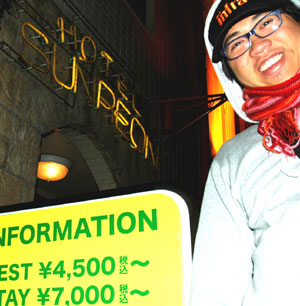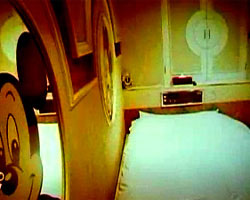When the Love Has Ended
The Quirky Series > Penis Fest > Love Janitor > Maid Cafe > Race Queen > Cosplay > Pastors > Melons > Xmas
Most know that the ideal Christmas in Japan centers on romance. While Christmas cakes and KFC dinners may be nice for some, the ultimate for couples involves stealing away to a love hotel for a few intimate hours of passion on December 24th.
 This week the Captain examines what happens when the love has ended - he chats with a love-hotel janitor.
This week the Captain examines what happens when the love has ended - he chats with a love-hotel janitor.
One of the lights on the board changes from red to green to signal that a room has just been vacated.
"Go!" barks the female supervisor.
Jong Pairez and his partner pack up their equipment and bolt from the control room. They have five minutes.
The crew is the night-shift janitorial team at a Shibuya love hotel - one of the 17,000 often funky, gaudy lodges scattered near train stations and expressways in Japan that are designed for short-term amorous encounters.
Under the watch of their hawkish supervisor, it is now the team's job to restock such amenities as toothbrushes and condoms, scrub the toilet, change the sheets, and mop the floor at a pit-crew pace so that the room can be made available as soon as possible.
Bumping into strangely matched couples, disposing of bodily fluids of wide variety, and retrieving discarded playthings are a challenging part of the job description.
"Working in a love hotel is an adventure in that you are learning something you never knew about before," says the bespectacled twenty-seven-year-old from the Philippines.
Though his 700-yen-an-hour wage is meager, Jong's forensic-like observations of what goes on when the lights go out offer an interesting look into an industry that is massive, so much so that it is gaining the attention of big-time investors.
 The inns tend to be clustered together, allowing guests to stroll past each building's various fountains and spires to select a desired theme, which could amount to anything from a cartoon character to a medieval castle to a Caribbean resort. Given the romance tied to Christmas Eve in Japan, that holiday is a particularly busy time.
The inns tend to be clustered together, allowing guests to stroll past each building's various fountains and spires to select a desired theme, which could amount to anything from a cartoon character to a medieval castle to a Caribbean resort. Given the romance tied to Christmas Eve in Japan, that holiday is a particularly busy time.
Once inside the ornate lobby, decorated perhaps in shapely chrome or adorned in vases of flowers, a room that satisfies the wants of the couple is selected from a board of illuminated placards showing a picture of the interior. The cashier, or front-san, passes on the key. Rates vary depending on the contents of the room and length of stay, but 4,000 to 10,000 yen is common for a few hours of use.
With the Philippines being relatively conservative and very Catholic, Jong mentally prepared himself for this position when he started just over one year ago. But after working at two hotels, he's realized there is something more than simple romance involved. "How do I describe it," he asks, "kitsch?"
These establishments are not flophouses. The rooms are intended to create large dream-like spaces that are usually not possible in most of Japan's cramped apartments. Simple rooms may seek an ambient feel through black lights and mood music. Rooms targeted to younger guests could be outfitted in Mickey Mouse images with PlayStations, karaoke machines, and DVD players as in-room entertainment. More luxurious accommodations come with household appliances and even vending machines.
 Guests often arrived equipped. Like skilled assassins who drop their weapons at the scene after a single use, glass dildos, jars of ointments, transparent vibrators with neon interior lights, red love ropes, and candles are very frequently left behind.
Guests often arrived equipped. Like skilled assassins who drop their weapons at the scene after a single use, glass dildos, jars of ointments, transparent vibrators with neon interior lights, red love ropes, and candles are very frequently left behind.
The theme of the hotel generally dictates the type of couples. Jong's first hotel dismissed with any general niceties and presented a quick-and-dirty look that one of his coworkers described as "looking like a hospital."
"In my first hotel, I always saw old guys with very young girls," he remembers of the prostitution slant of the clientele. "Sometimes I thought he could have been the father of the girl." His current hotel has European-inspired furnishings that is proving to be a hit with Tokyo's youth. Jong thinks the teenagers using the rooms might be looking for something that is different from their day-to-day living accommodations.
With Shibuya being one of Tokyo's larger entertainment areas, alcohol plays a role in the condition of the guests, especially on Friday and Saturday nights.
"Sometimes guys ask me to help carry their dead-drunk girlfriends to the room," Jong says. "One time I had to clean a girl's puke from inside the elevator. It was kinda messy, but it's part of my job."
 During the course of one of his five-hour shifts, in which he might clean thirty of the hotel's 60 rooms, cigarette burns in the sheets and ripped wallpaper occur on occasion but bloodstains resulting from menstruations and perhaps first-time experiences are routine.
During the course of one of his five-hour shifts, in which he might clean thirty of the hotel's 60 rooms, cigarette burns in the sheets and ripped wallpaper occur on occasion but bloodstains resulting from menstruations and perhaps first-time experiences are routine.
"I've noticed that most of the garbage in the toilet is napkins," Jong says. "But if I see blood in the bed and no napkins in the toilet, it is obviously not as a result of a menstruation."
Unlike the pachinko parlors and game centers that share the same general turf, Jong experiences little in the way of commotion, with the primary sounds he hears being reserved to the steady "moans and groans" emanating from the rooms. Gunshots, however, were fired when police raided a nearby casino and a pair of yakuza once entered his hotel to emphatically scold a customer of one of their prostitutes for not using a condom.
Because the business tends to be associated with gangster activity and the water trade, it generally generates a negative reputation. But that hasn't stopped investors from becoming increasingly interested in taking a piece of an industry said to generate annual revenues of 4 trillion yen, an amount that is double the entire anime market.
Japanese investment firm Global Financial Support Co. is presently offering love-hotel investment funds. The Hope Alpha 2 fund, for which there is a minimum 500,000 yen outlay, invests in the 25-room (faux bricks and all) Hotel P-Door in Tokyo's Taito Ward. Any profits generated by the hotel are subsequently divvied up and returned to investors as dividends.
Last year MHS Capital Partners pooled together 1.2 billion yen for an investment fund that purchases love-hotel properties. Earlier this year rumors circulated that Goldman Sachs was set to purchase 45 billion yen in loans backed by investments that include love-hotel assets.
The general recession-proof nature of a business that feeds human desire and the high room turnover, which can result in occupancy rates over 200%, are said to be the main investment attractions. Jong knows all about the latter.
 "We are obliged to clean a room strictly in five minutes if there is no available room for waiting guests," says Jong, who claims that his speed has improved over the course of his love-hotel tour of duty. "During ordinary days we can expand our time to six or seven minutes."
"We are obliged to clean a room strictly in five minutes if there is no available room for waiting guests," says Jong, who claims that his speed has improved over the course of his love-hotel tour of duty. "During ordinary days we can expand our time to six or seven minutes."
When not scouring toilets, unplugging stopped pipes, or repairing furnishings, Jong spends his time in the control room. There, he sits below the blinking signal board and alongside his coworkers, who are Japanese and other foreigners, counting and sorting the various amenities.
His bosses are always watching.
"It depends on their mood," he explains of the treatment he receives from his supervisors. "If they are happy, well then we are happy. If they are in a bad mood, they pick on you all the time."
Jong, who experiments in ambient music in his free time, thinks he will remain at this job until his visa, which he obtained as a result of his mother being an English teacher, runs out in 2007.
He maintains that while it is a dirty job, the key benefit is that Japanese language ability is not necessary, as it would be at a camera store or fast-food restaurant.
"You don't need language," Jong says, "you use common sense to clean a toilet."
The Quirky Series > Penis Fest > Love Janitor > Maid Cafe > Race Queen > Cosplay > Pastors > Melons > Xmas

